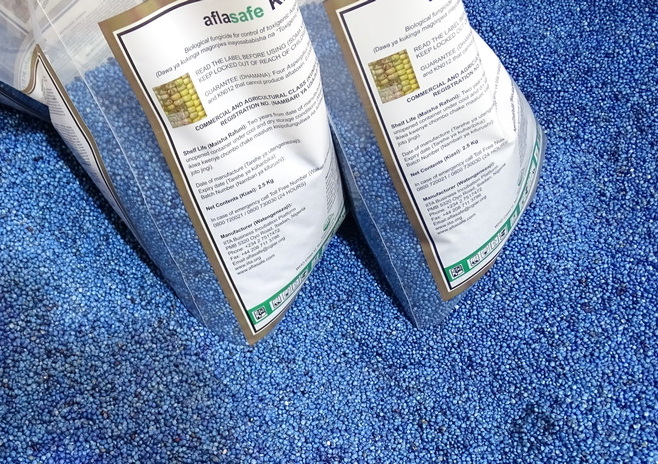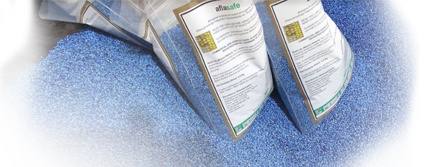Harvestfield Industries Ltd to exclusively manufacture and distribute Aflasafe™ in Nigeria
Ibadan, Nigeria, 12th March 2018 – Today, Africa’s most populous nation – Nigeria – takes a giant stride forward in the fight against aflatoxin in food. A formal Technology Transfer and Licensing Agreement (TTLA) will be signed between the International Institute of Tropical Agriculture (IITA) – the developers of Aflasafe – and Harvestfield Industries Ltd, Nigeria. The company is IITA’s partner of choice for the manufacture and distribution of Aflasafe™, the name for the product customised for Nigeria, to protect maize and groundnuts from deadly aflatoxin. Media reports early this year reveal aflatoxin in Nigeria’s food has an alarming death toll, on top of the crippling economic cost it exacts.

But a remedy is also at hand. “Aflasafe saves lives,” said Dr Kenton Dashiell, IITA’s Deputy Director General, Partnerships for Delivery. “In the fight against aflatoxin in food, the private sector is extremely crucial in ensuring our market-ready product is available and accessible, thus reaching the farmers and markets we need it to reach.” Aflasafe is a 100% natural local product.
Lamentably, despite the gravity and deathly toll of the problem, awareness of the perils of aflatoxin in food – as well as its solutions – is low in Nigeria, as in many other countries afflicted by the scourge. Harvestfield has already taken this problem head-on. Last month, the company undertook a nationwide aflatoxin-awareness campaign, targeting all six geopolitical zones. They reached 54 communities across 28 states. The campaign helped Harvestfield refine its awareness-creation and marketing approach, and they plan a repeat campaign this month.
Harvestfield will sensitise farmers, millers, farm-produce aggregators, exporters and food processors on the dangers of aflatoxin, the solution Aflasafe offers and how it works, and – most importantly – demonstrate effective and responsible ways on using Aflasafe.
“Our vision is to be the leading solution-provider for agricultural farming systems in Nigeria and the West Africa sub-region,” said Mr Martins Aderemi Awofisayo, Managing Director, Harvestfield. “Aflasafe is in line with the ongoing effort by the Federal Government to ensure zero rejection of our exports, thereby earning extra foreign exchange through exports and economic diversification.”
This year alone, Harvestfield will produce and sell 1,500 metric tonnes of Aflasafe, enough to cover 150,000 hectares of maize and groundnuts. While Harvestfield is constructing its own Aflasafe factory at its manufacturing complex at Km 40, Lagos–Ibadan Expressway, Asese, Ogun State, the company will also sign a toll-manufacturing contract with IITA’s Business Incubation Platform for Aflasafe production. As part of this collaboration, IITA will gradually transfer technical know-how to Harvestfield, and provide business-development support. The agreement goes beyond pure sales: while the TTLA grants Harvestfield five-year exclusive manufacture and distribution, it is pegged to stipulated annual targets and requires effective product distribution to farmers.
This is the second Aflasafe licence that IITA will be granting to a private company, after Senegal last year, which too was pegged to performance.
“The partnership we are sealing today with Harvestfield is the result of a long process which started in 2017,” said Mr Abdou Konlambigue, Managing Director of IITA’s Aflasafe Technology Transfer and Commercialisation initiative (ATTC). “It paves the way to ensuring sustainable availability and accessibility of Aflasafe throughout the country. We are committed to ensuring this partnership is a success in order to contribute to making food safe, and to improve the competitiveness of local produce in the regional and international markets,” he added.
The effects of aflatoxin on Africa’s health and wealth are immense. Aflatoxin causes an estimated 5–30% of liver cancer worldwide, the highest incidence being in Africa (30%). An invisible poison that you cannot see, taste or smell, aflatoxin suppresses the immune system and stunts child growth. Poisoning can begin even before birth through mother-to-baby transmission. Thereafter, many young children continue ingesting the toxin through bottle and breast milk – since aflatoxin gets passed on through our bodies from food to milk – and later through their earliest solid mouthfuls as they are weaned onto maize- or groundnut-based diets. It is an unforgiving and cumulative poison, piling up in our bodies as we continue to eat and drink contaminated foods. So dire is the problem that in some countries, studies show nearly all (more than 95%) of the children under five have aflatoxin in their bodies, indicating high aflatoxin exposure even at this early age.
Internally, approximately 40% of the produce in African markets exceeds the aflatoxin maxima allowed. Externally, Africa potentially loses up to USD 670 million annually in export opportunities. According to the United Nations Food and Agricultural Organization, Nigeria’s groundnut exports have tumbled to near zero, from a high of 291,000 tonnes in 1970 to a mere 1,983 tonnes in 2013. According to the Partnership for Aflatoxin Control in Africa, aflatoxin is the most highly probable cause of this massive economic loss.
Standing on solid science, Aflasafe is the fruit of more than a decade-and-a-half of dedicated publicly funded research by IITA and partners in and out of Africa.
The Nigerian product, Aflasafe™, was the pioneer in IITA’s suite of country-customised Aflasafe products for Africa. It was developed for Nigeria by IITA in collaboration with the United States Department of Agriculture – Agricultural Research Service, University of Bonn (Germany) and University of Ibadan. Since its inception in Nigeria, Aflasafe has spread further afield in Africa. IITA’s Aflasafe research currently straddles 16 African countries, of which ATTC is targeting 11 for commercialisation. Besides Nigeria and Senegal, others are Burkina Faso, Ghana, Kenya, Malawi, Mozambique, Tanzania, The Gambia, Uganda and Zambia. Aflasafe is a product of IITA’s Business Incubation Platform (BIP).
Aflasafe is the first product from BIP to the private sector, in a bid to assure access and to ensure sustainable availability of technologies and products from IITA research. Over the next two years, more IITA products will be commercialised in Nigeria through BIP to provide farmers with products which give them competitive advantage, or improve their livelihoods.
Follow the TTLA signing ceremony on Twitter: #AflasafeLicenceNG
Media inquiries: Njeri Okono, Communications Specialist, Aflasafe Technology Transfer and Commercialisation initiative (ATTC)
LINKS
- News item on how the signing ceremony unfolded: Rolling out aflatoxin-safe harvests for Nigeria! Aflasafe leaves home for nationwide commercialisation
- How to use Aflasafe
- Drama: Short plays on Aflasafe
- VIDEOS in Pidgin: 1 min | 2 min
- AUDIO CLIPS in various Pidgin dialects: Hausa & Yoruba | Hausa & Igbo | Tiv & Yoruba | Tiv & Pidgin
- Aflasafe and aflatoxin
- Aflasafe Investors Forum, Nigeria
About ATTC: The Aflasafe Technology Transfer and Commercialisation initiative (ATTC) implemented by IITA identifies strategic options for partnership with private companies or government entities, executes those partnerships, and helps ensure the distinct Aflasafe products reach millions of farmers. The initiative will contribute to improved food safety and increased income for smallholder African farmers through using Aflasafe. ATTC’s target is to cover half-a-million smallholder hectares with Aflasafe in 11 countries where Aflasafe is − or is likely to soon be − a nationally registered product. These are Nigeria, Kenya, Senegal, The Gambia, Burkina Faso, Ghana, Malawi, Mozambique, Tanzania, Uganda and Zambia. ATTC’s activities are geared to increase Aflasafe’s availability and accessibility, and to improve access to lucrative aflatoxin-conscious markets for maize and groundnuts. Download ATTC brochure
About Harvestfield – Harvestfield Industries Limited was founded in 2000, commencing business in 2001, mainly importing and distributing agrochemicals and agricultural spraying equipment. Harvestfield also represents international companies in Nigeria such as Bayer, Dow, BASF and East-West Seeds, and has entered joint ventures with external partners. Harvestfield has 18 field offices/warehouses in all six geo-political zones of Nigeria.











One Reply to “Harvest time Nigeria! Aflasafe moves from research to nationwide commercialisation to protect food from deadly aflatoxin”